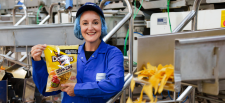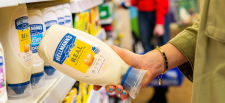Food Standards Scotland is highlighting to food and drink businesses in Scotland to be alert for potential food crime activity in their supply chains, as its Scottish Food Crime and Incidents Unit (SFCIU) is aware, via recent reports, that Covid-19 circumstances have created a factor or motivation for food crime.
Ron McNaughton, Head of SFCIU, said: “The vast majority of Scotland’s food and drink industry is legitimate and has adapted superbly to the challenges presented by the current epidemic, but unfortunately there is a small minority using the pandemic to commit fraud, with potential to impact business reputation and public health.
“To mitigate risks to your supply chain at this time,” he cited four points. “Carry out due diligence – map your supply chain and look out for any ‘choking’ points presenting an opportunity for corners to be cut, or weaknesses where systems/process are under increased pressure or have reduced resources. Get to know your supplier(s) – particularly if you are facing changes, such as a new supplier. Trace your products from source right the way through to consumer – to have confidence in the authenticity of the end product. Report food crime – please share any concerns to our free and anonymous hotline run in partnership with Crimestoppers on 0800 028 7926 to protect your food businesses and consumers.”
Food Standards Scotland has a joint guide, developed with the Chartered Institute of Environmental Health and the Food Standards Agency on improving fraud resilience for food and drink businesses.
The SFCIU says it is working with partners including industry, Scottish local authorities, Police Scotland, the Food Standards Agency and organisations such as the Food Industry Intelligence Network (fiin) and the Food Authenticity Network on intelligence-led initiatives to continue protecting public health and our reputable industry.
Food Standards Scotland supports the work of the Food Authenticity Network, which is an open-access website that provides information to help businesses secure food supply chains by mitigating food fraud, including services, guides and reports, access to food authenticity centres of expertise, and sign-posting to other useful services and resources.
Selvarani Elahi, Executive Director of the Food Authenticity Network, said: “Recent reports suggest the potential for increased food fraud in global supply chains due to the impact of Covid-19. Therefore, it is vital we continue the good practice in businesses to protect the safety and security of food supply chains.
“This is why we created a dedicated Covid-19 Resource Base on the Food Authenticity Network that pulls together global information to help businesses combat food fraud. We link to many resources, including the Institute of Food Science and Technology’s Covid-19 Knowledge Hub, which consolidates broader advice, practical guidance and links to resources to support individuals, smaller food businesses and larger food operations.
“Information on the Food Authenticity Network is freely accessible but I would encourage people to become a member, as it’s free and takes minutes. Along with our more than 1,800 members around the world, you’ll stay up-to-date with our monthly highlights email that rounds up the month’s news in one convenient place.”









